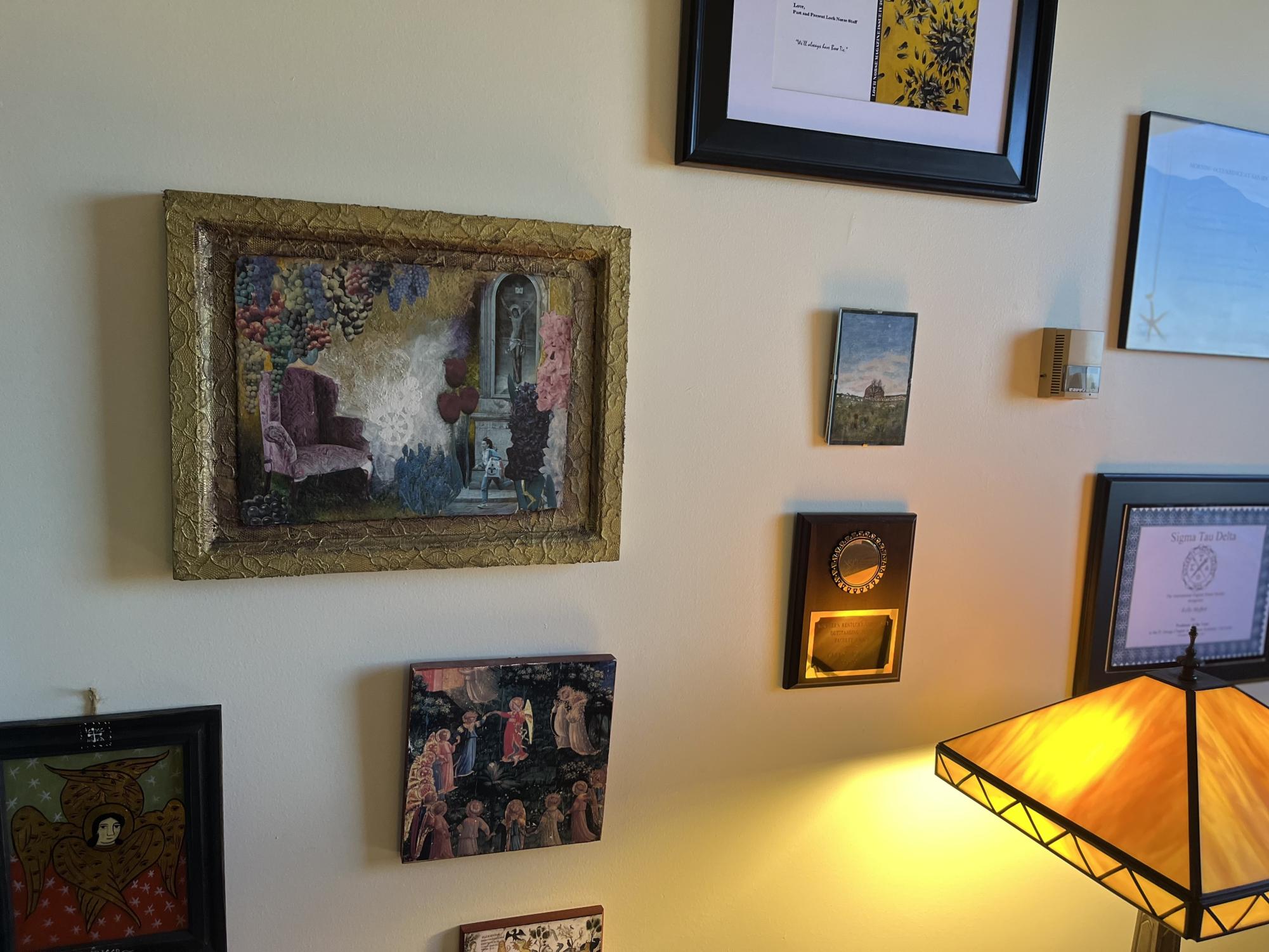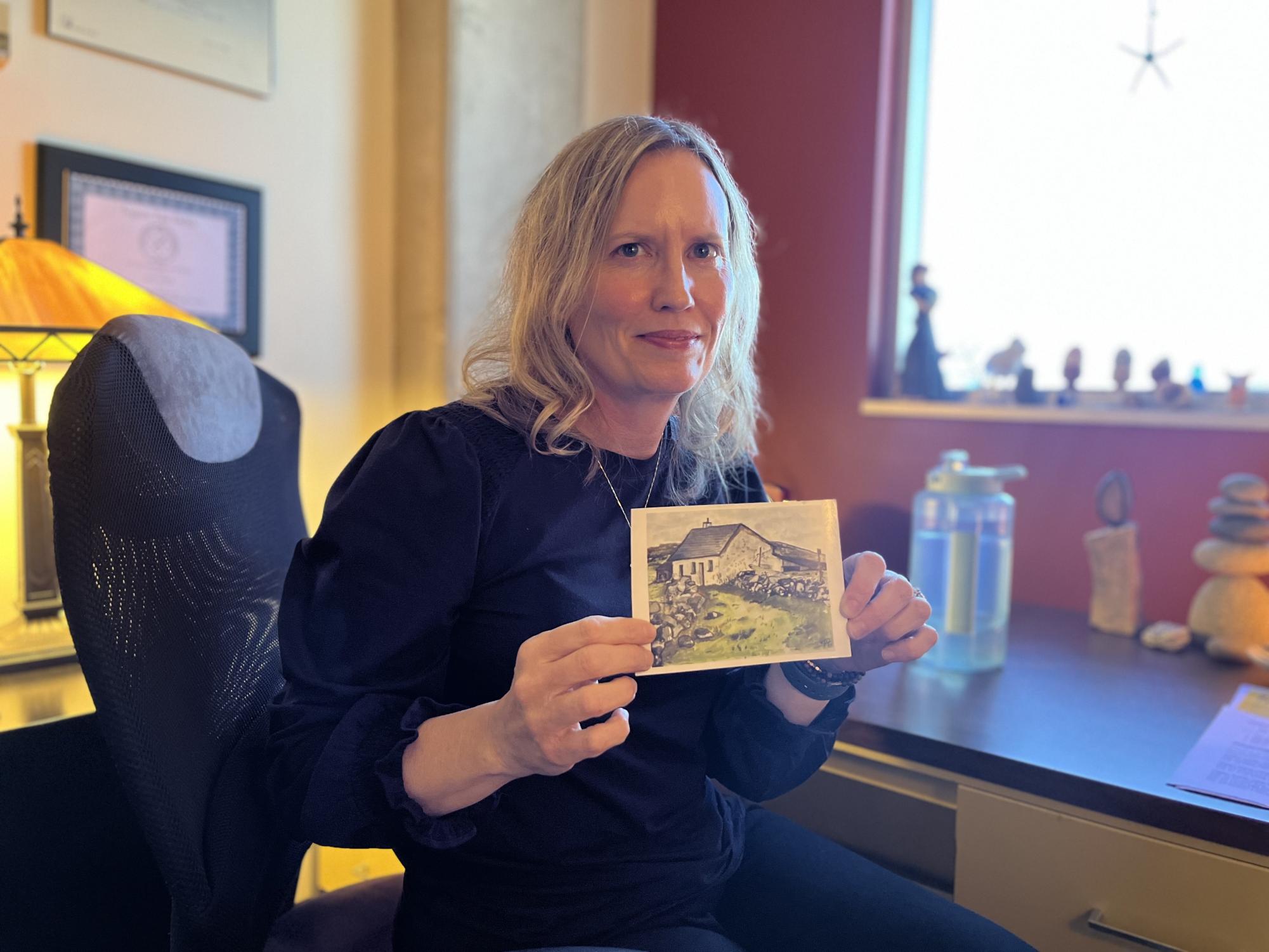Kelly Moffet’s office in Landrum Hall is something similar to a museum. Inside her dim and warmly-lit office, you’ll see eye-catching items from Moffett’s travels abroad and various other pieces of art and literature.
It’s a space that would remind you of a real-life scrapbook, featuring items like photos of her travels to Romania, tons of poetry and knick-knacks from abroad, with each item taking you back in time and telling you small anecdotes of Moffett’s past life experiences.
The artifacts embody who Moffett is: a published poet, a teacher of writing and a traveler who has pursued creative writing avenues in other countries. She’s had many articles published in literary magazines, such as Rattle, Barrelhouse, Versal, Colorado Review, Laurel Review and Cincinnati Review and more, according to her website. She’s also written two pamphlet-style chapbooks and three full-length poetry collections.
Early life and discovering her passions
Kelly Moffett grew up on a 10-acre farm tucked away in a small town outside of Pittsburgh. She grew up riding horses and showing dogs, an activity that would take up most of her free time on the weekends. That was until she arrived at Penn State University, where she began her bachelor’s degree studying theater in 1996.
In her first two years of college, she won principal roles like the part of Emily in Thornton Wilder’s “Our Town.” She even won actress of the year for the role.
“I was all excited. I wanted to be an actress,” Moffett said. But the first time she didn’t win a starring role, she began to question her future career. “I was kind of so disappointed. I realized, am I in this for the arts? Or am I in this for my ego?”
But it was always about the language for Moffett—it was the driving force that helped her get into poetry writing.
“I really, really understood that I actually liked the language. It was the language of the writing that I was most entranced with. And so, I shifted from acting to creative writing,” Moffett smiled.
Moffett did not embrace the switch easily. She had met her husband, Joe Moffett, when she was 17, and he had a clear goal of becoming an English professor and a writer. Moffett felt that she could not follow his path, so she tried to ignore her own passion for writing. “I was like, ‘I can’t do what he does,’ so I resisted it and resisted it until I couldn’t resist anymore,” she said.
So Moffett officially decided to make the switch.
“I changed my majors at the beginning of my junior year, which made me stay a whole extra year as an undergrad, but I just couldn’t once I had my first poetry class. That was it. I was done. I was hooked,” Moffett said.
Though her writing interests and journey began in college, Moffett has always had the gift of writing well. During her time in grade school she participated in talent show productions. She recalled one talent show that she did in the sixth grade.
“I had one English professor that always just praised my writing,” she said. “I’ll never forget when I wrote a sonnet that she praised so much, she made me read it out loud at this assembly. I felt really proud of my writing at that point. I was really thinking about writing and acting at the same time, even at an early age. It’s just that acting was the center stage until it wasn’t anymore.”
Although this experience was nerve-wracking, reading the words on a page made you feel like you weren’t on a stage with a live audience, Moffett said.
“I find the same thing happens to me today where you’ll have a bit of nerves before you start reading. But once you start, language is such a magical experience where you’re looking at the poem and then you’re inside of the poem,” she said.
In the midst of college life, Moffett found out that she would be a mother at the beginning of her senior year. She raised her child as a full-time student who was taking tons of rigorous high-level college courses.
“I gave birth to our son on the first day of our senior year of college,” Moffett said. “Because we were in such a committed relationship, we decided to have the child. It was a beautiful gift.”
Moffett also is a pet owner to her dogs, whom she adores.
Teaching
Moffett has been a professor of English for almost two decades. She began her teaching career at Kentucky Wesleyan College as an assistant professor of English and Creative Writing director. In 2010 she departed from Wesleyan and came to Northern Kentucky University. Aside from her professor role, she currently serves as the faculty advisor for Loch Norse literary magazine.
Although Moffett has decades-long experience as a published poet, you would never actually know it from the way she teaches.
“I really believe that I’m a writer among writers. I’m a practicing writer. That means that I am in the same trenches as all of the students,” Moffett said. “So my philosophy is that I faced the same blank page. I know how scary it is to sit there and know that it’s time to write.”
To be on an even footing with her students, she has them call her by her first name.
“I make sure that they can call me Kelly. We’re on the same level because we’re all practitioners. We’re all trying to develop a skill, and I’m here to give tips to help them on this journey,” Moffett said.
Grace Riley, who is a psychology and English double major and the co-editor-in-chief of Loch Norse Magazine, began working with Moffett during her junior year and believes the professor teaches with enthusiasm and care
“Getting to work alongside Kelly is great. She is always so enthusiastic, willing to help and is appreciative of the work my peers and I do,” Riley said.
Riley hopes that others understand Moffett’s impact on everyone she encounters.
“People should know what an inspiring person Kelly is. Not only does she treat each and everyone she meets with kindness and acceptance, but she is genuinely enthusiastic about helping her students succeed. She is a remarkable writer, teacher and mentor,” Riley said.
But Moffett’s impact doesn’t just stop at her teachings.
“I went through a bit of a rough period in my own life during that time, but her words of encouragement helped inspire me to move through it. As did sharing and reading poetry with other students,” said James Foss, a senior psychology major, creative writing minor and co-editor-in-chief of Loch Norse Magazine. “Several of them have now become my friends due to the incredible community that she put together. Even though that semester is long over, they echo my words, those classes too changed their lives.”
Foss added that Moffett’s experience as a working writer helps her craft meaningful feedback.
“She is a caring person with a lot of depth. Her writing advice comes from such a sincere place, as she wants you to be able to do your best work. Her feedback is also incredibly important since she is an absolutely astounding poet herself,” Foss said.
Stories from traveling abroad
Some international bookstores throughout Europe have programs where you can reside in the country as a guest writer and make it a place you call home for an extended period of time inside the bookshop.
Moffett’s main poetry publisher is an international publisher based in Ennistymon, Ireland, a place she has also studied poetry in.
“I was able to put my feet on the ground, hike, meet locals and just get to know the earth and the countryside and the people on these deep, deep levels. And I just became obsessed with Ireland,” Moffett said.
After coming back from these travels, Moffett knew she had to bring her students there.
“I traveled two more times and ended up making all these different connections and created a faculty-led program from the ground up,” Moffett said. “I created a program to take my students to Ireland, invited one colleague and she put her spin on it and added things to the syllabus. And we brought our first group to Ireland.”
Moffett then recalled “magic moments” from these travels with her students, including meeting Ireland’s last matchmakers.
“I brought my students to the last matchmaker in Ireland’s house,” Moffett said of Willy Daly, an 80-year-old man who has been matchmaking since he was a teenager. “He was such a character, of course. He sat at his kitchen table and played us Irish folk songs. And then he took out the sacred matchmaker book that his family all had.”
The matchmaker showed them ways that their wishes could be manifested.
“He told us that the different ways that we touch the book make our wishes come true. If you want to find someone, you can touch one way. If you want to keep your marriage, you have to touch it another way,” Moffett said. “So that was cool to meet the last matchmaker.”
This was one of many experiences that Moffett shared with her students. 
A look into the art inside Moffett’s office in Landrum Hall
Current/future projects
Moffett hasn’t stopped pursuing learning projects abroad and she isn’t going to stop any time soon. Currently she’s working on a research project of artwork produced by those experiencing mental health disorders from the years 1840 to 1940.
Just last month, Moffett was able to go to Germany to visit the Prinzhorn Collection, an archive that features artwork from mental health patient, which is housed at Heidelberg University Hospital in Germany.
“I’m really interested in the stories of those artists, because their artwork was actually given to Prinzhorn by their doctors,” Moffett said. “It’s not like an artist sending out their own work. So I’m wondering, have they been exploited? What kind of stories can be told about that?”
A book that came out about the collection tipped Moffett off to begin this research. Conscious considerations have been made to help Moffett navigate the personal subject matter and to be as respectful as possible towards the artwork.
“It’s a whole new learning process to figure out. How do I navigate this subject matter in a way that respects it in exactly the way it needs to be respected?” Moffett said. “I can tell my own truth, but how do I write these stories and respect them deeply? That navigation has been interesting.”
As for other future projects, Moffett will be releasing a full poetry collection next year.



